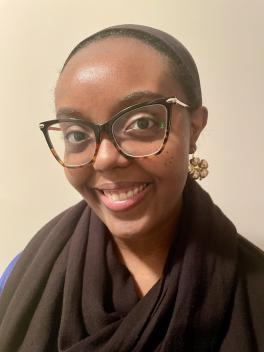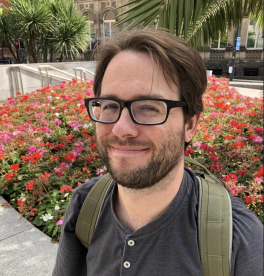
Joy Peltier is joining us as an assistant professor. She comes to us from the University of South Carolina, where she was an assistant professor of Linguistics and English. She is a contact linguist and creolist interested in language emergence and change, highly multifunctional/context-dependent features of language, and language users’ (meta)linguistic knowledge. She is currently working on a project involving pragmatic markers in Kwéyòl Donmnik (Dominica Creole). She has also worked to promote the inclusion of minoritized languages in linguistics pedagogy (she’s a collaborator on the MULTI project) and is a faculty contributor to the Black Academic Development Lab at Stanford.

Ryan Walter Smith is joining us as a visiting assistant professor. He previously held positions at the University of Manchester and the University of Texas at El Paso. His work is in formal semantics, and his research focuses more specifically on the expression of stativity and change of state cross-linguistically, abstract nouns, resultatives, and plurality (especially similative and associative plurality). His work is primarily informed by the Iranian languages, especially Persian and Sorani Kurdish, as well as by Japanese, Spanish, and English.
Ziyuan Cao finished an MS in Computer Science from Georgia Tech. He is interested in the sentence processing mechanisms learned by computational language models, and how they incrementally construct syntactic representations.
Chase Harmon completed his BA in Russian and Linguistics here at Ohio State, where he worked on a project about Albanian and Indo-European. He plans to work on computational linguistics and psycholinguistics in his graduate study.
Ellie Wren-Hardin holds an MA from Kentucky. Both her previous and planned work focus on minority languages of the Caucasus, with emphasis on language contact, shift and morphological change.
Sahil Patel earned an MA in Linguistics from the University of Mumbai, where he worked on documenting Multani. He is interested in verbal semantics and plans to study telicity and its origin in light verb constructions in Gujarati and other Indo-Aryan languages.
Yue Yin holds an MA from the University of Peking. She has worked on speech perception/production asymmetries in Chinese regional languages and dialects; she hopes to investigate the application of exemplar models to phonological processing.
Yasemin Fincan has an MA in English Linguistics from Eberhard Karls University, where she completed a thesis about object gaps. She plans to specialize in formal syntax and Turkish linguistics, with a focus on polarity ellipsis, the syntax and semantics of light verb constructions, Turkish focus positions, and Turkish morphology.
